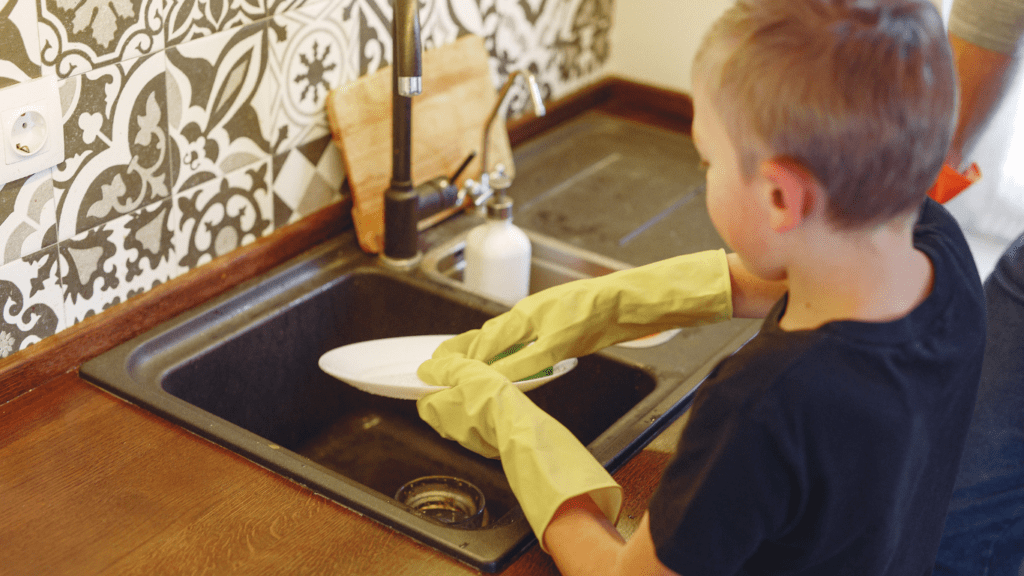Importance Of Kids Helping Around The House
Engaging kids in household chores is crucial for their development. Studies show that children who contribute to housework develop a stronger sense of responsibility and independence. Participation in daily chores equips kids with essential life skills like time management, organization, and problem-solving. When children help around the house, they learn teamwork and cooperation, fostering better communication skills.
Kids who are involved in household tasks also tend to have higher self-esteem. Completing tasks successfully provides them with a sense of accomplishment. They see the direct results of their efforts, which boosts their confidence. This active participation combats entitlement, as children understand the value of hard work and the effort required to maintain a household.
Involving kids in housework strengthens family bonds. Shared responsibilities create opportunities for family members to spend quality time together. Joint activities like cooking dinner, doing laundry, or gardening encourage collaboration and strengthen relationships within the family. These shared moments can lead to positive memories and a more cohesive family unit.
Overall, getting kids to help around the house benefits their personal growth and the household’s efficiency. By making chores fun and engaging, kids are more likely to participate willingly, resulting in a win-win situation for both parents and children.
Choosing Age-Appropriate Chores
Assigning chores tailored to your child’s age can make the tasks more manageable and enjoyable for them.
Chores For Toddlers
Toddlers can help with simple tasks that teach basic skills. Examples include:
- Picking up toys
- Putting dirty clothes in a hamper
- Wiping up small spills
These activities cater to their developmental stage and foster early responsibility.
Chores For Preschoolers
Preschoolers can handle more structured tasks that build on their growing abilities. Suitable chores are:
- Setting the table
- Feeding pets
- Watering plants
Involving preschoolers in these chores helps reinforce their sense of contribution and improves motor skills.
Chores For School-Age Children
School-age children can manage a variety of chores that require more precision. Examples include:
- Making their beds
- Taking out the trash
- Sweeping floors
These tasks enhance children’s organizational skills and teach them the value of maintaining cleanliness.
Chores For Teenagers
Teenagers can take on more complex responsibilities that prepare them for adulthood. Suitable chores are:
- Cooking simple meals
- Mowing the lawn
- Doing laundry
Assigning these chores helps teenagers develop independence and learn essential life skills.
Making Chores Fun

Engaging kids in household chores can be easier by making those activities enjoyable. Transforming chores into interactive and rewarding experiences motivates children to participate enthusiastically.
Incorporating Games And Rewards
Turning chores into games makes tasks more appealing. Create challenges like “Race Against the Clock” where kids compete to complete tasks quickly. Use scavenger hunts for organizing toys. Rewards work as excellent motivators. Offer points for each completed chore, redeemable for small prizes or privileges. For example, 10 points might earn extra screen time or a favorite snack.
Creating A Chore Chart
A visual chore chart helps to track responsibilities. Design one with colorful markers and stickers to engage children. Assign specific tasks to each child and update the chart regularly. This method enables accountability and organization. For instance, a weekly chart might include “Monday: Set the table, Tuesday: Feed the pets.” Let kids decorate their sections to foster ownership.
Setting Up A Family Cleaning Time
Designate a weekly cleaning time for the whole family. Make it a fun event with music and breaks. Each family member gets a specific area or task, promoting teamwork. For example, designate 30 minutes every Saturday morning for cleaning. Rotate chores to prevent monotony. This practice instills a sense of collective effort and shared responsibility.
Teaching Responsibility And Building Skills
Assigning household chores to kids plays a crucial role in teaching responsibility and building essential life skills. Integrating fun and simple tasks allows children to learn while contributing to the household.
Developing A Routine
Establishing a consistent routine helps kids understand the importance of responsibility. I recommend setting specific times for chores, such as after school or before bedtime. This structure creates a sense of predictability. For example, assigning tasks like setting the dinner table every evening or making the bed each morning ingrains a habit, ensuring consistency. Additionally, a visual schedule or calendar makes the routine easier to follow, showing kids what to expect.
Encouraging Independence
Giving children autonomy in their tasks boosts their confidence and independence. I suggest letting them choose from a list of age-appropriate chores, such as sorting laundry or organizing toys. By allowing choices, kids feel a sense of control and are more likely to engage willingly. For instance, a child might prefer watering plants over sweeping the floor. This involvement in decision-making empowers them, fostering a sense of ownership over their responsibilities.
Offering Praise And Feedback
Positive reinforcement is vital for maintaining motivation and recognizing effort. I advocate for specific and genuine praise when kids complete their chores, highlighting their accomplishments. For example, saying, “I noticed how neatly you folded those clothes, great job!” acknowledges their effort and encourages continued participation. Constructive feedback, such as, “Next time, try to pick up all the toys,” guides improvement without discouraging them. Combining praise with constructive suggestions maintains a supportive environment, promoting growth and a positive attitude toward responsibilities.
Overcoming Common Challenges
Getting kids to help around the house can be challenging. Facing resistance, balancing schoolwork, and adjusting expectations are common hurdles.
Dealing with Resistance
Addressing resistance is crucial for seamless chore integration. Engaging children by explaining the importance of chores fosters understanding. Use positive reinforcement such as praise or small rewards to motivate them. Ignoring minor pushback while consistently encouraging participation builds resilience and cooperation over time.
Balancing School And Chores
Effective balance between school and chores prevents overwhelm. Establish a set schedule integrating both activities. Allocate specific times for chores, ensuring they don’t clash with homework or leisure time. Communicate with children about their workload to adjust chore timings as needed, safeguarding their academic performance and personal well-being.
Adjusting Chore Expectations
Aligning chore expectations with a child’s age and ability is vital. Provide clear instructions and demonstrate tasks to set achievable goals. Gradually increase chore complexity as they develop skills. Flexibility in assigning tasks ensures children remain engaged and capable, tailoring responsibilities to their growing capabilities.




